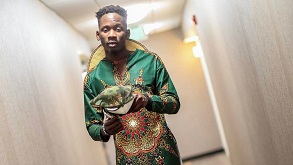
Mr Eazi, the crooning singer and rapper, sits on the symbolic border of two distinct cultures and countries: Nigeria, where he was born and raised, and Ghana, where he went to college and spent his young adult years recording music. He has become a major artist in West Africa’s flourishing music industry, which is centered largely on Lagos and has produced a number of Nigerian superstars, such as Wizkid, who is an associate of Eazi’s and has done more to popularize the Lagos sound than anyone. But in Eazi’s music, there is as much a unique Ghanaian influence as a Nigerian one: Songs like the smash hit “Leg Over” have the energetic pulse of Nigerian Afrobeats, but with Eazi’s slow, lulling delivery that the artist says is inspired by the chilled-out vibe of Ghanaian life. He calls his signature blend “banku music,” a reference to Ghana’s traditional staple food. “You eat it with soup—banku has three different flours, so it’s heavy, and it makes me relaxed and tired,” he says. “The first time I ever recorded a song, I went straight from the banku joint to the studio, so I was sleepy. Some people say I sing like I don’t really care. Like, ‘Yo, bro, are you really singing?’ That’s banku.”
Eazi also reps Ghana in his wardrobe, which is characterized by a mix of contemporary streetwear and traditional
textiles—including his now-signature straw hat—from the Ashanti region and the north of the country. He’s handsome and stylish, with a slim build and close-cropped hair, and has a penchant for playful jewelry, bright colors, and narrow-cut blazers and turtlenecks. Asked about his fashion sense, he told us ahead of a big show in New York (tonight at PlayStation Theater) that everywhere he goes, Ghana and Nigeria go with him.
Sport a Signature Hat—And Stock Up
These hats are produced in northern Ghana, and they’re synonymous with herdsmen and gold miners. They are handmade, and they wear them because the sun is heavy there. They’re knitted but actually made of the same material they use to make baskets. The hats are sturdy. Even when I put them in a box in my luggage on tour, when I bring them out, I just have to stretch them out a little bit and they get their shape back. Ghana is very, very big on reggae music, so in a lot of art forms you will see Rasta expressions—that’s why the hats are red, gold, green. Anytime I go for a show and I don’t have the hats, it’s an issue. [The audience] feels like I’m incomplete without one. I throw them out to the crowd at shows when I’m on tour, so I have just four left, but my manager is coming with 20. When I played in Ukraine, I was shocked to look out in the crowd and see people wearing them!
Rock Bold Jewelry
The Ashanti culture is wrapped around gold. Gold is like sun. It’s part of the culture. You see the chiefs wearing these fat gold beads. I don’t like flamboyance, but I stayed in the Ashanti region for seven years of my life—I can’t deny that it’s part of me. So I will wear big necklaces and bracelets onstage. The jewelry is made in Kumasi. I keep it traditional. When you see it, you know this jewelry is worn by a chief. So, okay, I’m a chief because I wear the chief’s jewelry. I get them handmade, but right now I’m in the process of mass producing them—the first order is going to be close to 6,000 units. I’m going to sell them at the shows.
Symbolism Counts
I wear beads with the Adinkra, symbols used by Ghanaian tribes to pass messages. Each symbol connotes a very deep meaning. I like two in particular. The Gye Nyame, which I wear on my bag, means the supremacy of God, which reminds me there is a supreme being. And there is one other that I love the most, which is the Siamese crocodiles. That is the most important symbol to me: It shows two crocodiles coming together like they are trying to fight for food, but they share the same stomach. It reminds me that it’s the same worldwide. People are fighting for their identity: race, country, tribe, sexual orientation, but at the same time they all have the same soul. It’s just one race—one human race.
Make a Statement—Even if It Causes a Little Controversy
I wore an outfit that was the most controversial thing in fashion this year. The materials used for these designs are from what we call the Ghana-must-go bags. At one point, there was a lot of Ghanaians in Nigeria because of the oil boom. The Nigerian government asked the Ghanaians to go back. There was a mass exodus, and they would use these bags, because they didn’t have time to get a proper suitcase. Going back and forth between Nigeria and Ghana, I would notice that the businesswomen, to bring goods back and forth, would use the Ghana-must-go bags. I feel like this bag now represents me: Mr Eazi, the Yoruba boy who went from Nigeria to Ghana. I called my stylist and said, “I want to dress in Ghana-must-go!” And I said I wanted it tailored in the most prestigious traditional Nigerian fit. A lot of people got mad! They said they’d fight me in the street. But I’ve also seen people wearing it on Instagram. It’s getting the youth to wear the Ghana-must-go. At the end of the day, it’s all love.
Source: VOGUE







